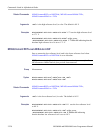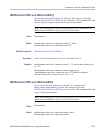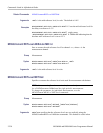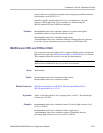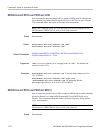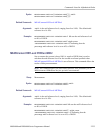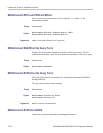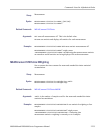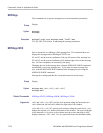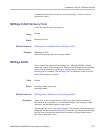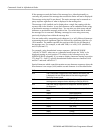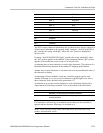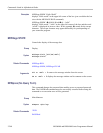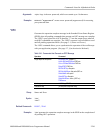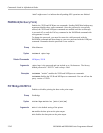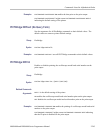
Commands Listed in Alphabetical Order
MESSage
This command sets o r queries message box (screen annotation) parameters.
Group
Display
Syntax
MESSage
MESSage?
Examples
MESSAGE? might return MESSAGE:SH OW "TP401";B OX
271,82,292,114;STATE 0
indicating the message parameters.
MESSage:BOX
Sets or returns the co-ordinates of the message box. This command does not
display the message unless MESSage:STATE is on.
X1 and Y1 are the screen coordinates of the top left corner of the message box.
X2 and Y2 are the screen coordinates of the bottom right corner of the message
box. All four coordinates are returned by the query.
Changing the text in the message box, using the MESSAGE:SHOW command,
automatically resizes the message box. If you want a custom message box
size, send the MESSAGE:BOX command after changing the text using the
MESSAGE:SHOW command.
Message box settings and data are saved and restored in saved setups.
Group
Display
Syntax
MESSage:BOX <X1>,<Y1>[,<X2>,<Y2>]
MESSage:BOX?
Related Commands
MESSage:STATE, MESSage:SHOW, MESSage:CLEAR
Arguments
<X1> and <X2> = 0 to 1023, a nd are pixel positions along the horizontal axis.
<X1> defines the left and <X2> defines the right side of the window.
<Y1> and <Y2> = 0 to 767, and are pixel positions along the vertical axis. <Y1>
defines the top and <Y2> defines the bottom of the window. The reserved height
of all characters is 16 pixels so the window must be at least that high to fully
display characters.
<X2> and <Y2> are optional because the ME SSAGE:SHOW
2-236 MSO4000 and DPO4000 Series Programmer Manual



